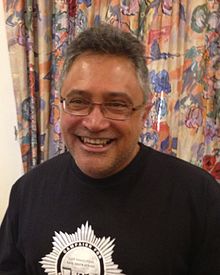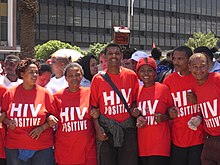Zackie Achmat
Abdurrazack "Zackie" Achmat (born March 21, 1962 in Vrededorp , Johannesburg ) is a South African anti-apartheid and LGBT activist . Achmat is the founder of the Treatment Action Campaign (TAC), which campaigns for people with AIDS , and headed the organization between 1998 and 2008.
Life
First political activism and imprisonment
Achmat was born on March 21, 1962 as the son of a Cape Malay , Muslim-conservative family in the Johannesburg district of Vrededorp. His father, Suleiman Achmat, was a member of the South African Communist Party , his mother, Mymoena Achmat, was a trade unionist for the Garment Workers Union . He grew up with his mother and aunt in the Salt River suburb of Cape Town.
Achmat left his parents' home at the age of 14 and began to be politically active. In 1976 he took part in the school demonstrations in Soweto . In 1977 the police arrested Akhmat for allegedly setting fire to his school, Salt River High School , to demonstrate against apartheid policies. He then spent the time between 1977 and 1980 in prison. During this time Achmat dealt with the works of Karl Marx and Leon Trotsky , which were banned in South Africa , and supported the calls for boycotts and actions against Fattis & Monnis and Wilson Rowntree with writings . The ANC , which is banned in South Africa, recruited Achmat while he was in custody.
After his release from prison he was mainly involved in the Trotskyist-Marxist wing of the ANC (“Marxist Workers Tendency”) and for educational campaigns within the ANC. In 1984 Achmat founded the Bellville Community Health Project together with Jack Lewis . In 1992 Achmat graduated from the University of the Western Cape with a Bachelor of Arts Honor Degree in English Literature .
Commitment to LGTB rights, foundation of ABIGALE
In 1990 Zackie Achmat was diagnosed with the HI virus . As a result, Achmat began to campaign primarily for the rights of gays and lesbians as well as people infected with HIV and AIDS in South Africa in general.
Together with his sister Midi Achmat, he founded the Association of Bisexuals, Gays and Lesbians (ABIGALE) in Cape Town in 1992 . Above all, the association campaigned for the legal strengthening of bisexuals, lesbians and gays; it succeeded in introducing the right to non-discrimination on the basis of sexual orientation in South Africa's 1993 transitional constitution . In 1994, Achmat and other colleagues founded the National Coalition for Gay and Lesbian Equality , with the aim of preserving the right to non-discrimination previously fought for in the provisional constitution in the constitution adopted in 1996 - which was also achieved.
Foundation of the Treatment Action Campaign (TAC)
At the end of 1994 Achmat began working for the Aids Law Project , which had previously been founded by Edwin Cameron . The initiative, which Achmat also led in the meantime, campaigned for a reduction in AIDS drug prices in order to make these accessible to disadvantaged sections of the population. Achmat and Cameron founded the Treatment Action Campaign in December 1998 , after his colleague Simon Tseko Nkoli had died of AIDS.
Under Achmat, who headed the Treatment Action Campaign from 1998 to 2008, the topic of AIDS, dealing with HIV-positive people and the difficult access to AIDS drugs gained in media importance. The initiative mainly used means of media attention that had already been used successfully in the anti-apartheid movement. Among other things, the T-shirts of the initiative with the label “HIV POSITIVE”, which were used to combat discrimination against HIV-positive people, became known. Another avenue used was the production and distribution of films on the subject, including Patient Abuse (2001), It's My Life (2001) and the television series Siyayinqoba Beat It! (since 1998).
Between 1998 and 2001 in particular, the initiative focused on access to AIDS drugs. Among other things, she organized a global campaign under Achmat against the Pharmaceutical Manufacturer's Association , which had previously sued the Mandela government with the project for legal access to cheap drugs. He himself flew to Thailand, among other places, to import large quantities of the AIDS generic drugs that were banned in South Africa. Achmat also used his own biography as an element of the campaign, in that the HIV-positive himself refused to take antivirals for years unless broad sections of the population had access to them.
In 2003 Achmat and the Treatment Action Campaign got involved against the South African government under Thabo Mbeki with the aim of adopting a general, national plan for the fight against AIDS / HIV. Mbeki and the then health minister Manto Tshabalala-Msimang denied the connection between HIV and AIDS and recommended eating fruit and vegetables instead of treatment with antiretroviral therapy (see also AIDS denial ).
In 2008, Zackie Achmat resigned as head of the Treatment Action Campaign after ten years, but remained active in the organization. Both the Treatment Action Campaign and Zackie Achmat personally received numerous honors and prizes for their civil society work. These include the Homo Homini Prize (2001), the Desmond Tutu Leadership Award (2001), the nomination as one of TIME magazine's Heroes of the Year (2003) and the Nelson Mandela Award for Health and Human Rights (2003 ). In 2003 the Quaker American Friends Service Committee nominated Zackie Achmat and the Treatment Action Campaign for the Nobel Peace Prize . Achmat also received academic honors: he received an Honorary Masters Degree from the University of Cape Town in 2002 , an Honorary Doctor of Law Degree from the University of Natal in 2003 and an Honorary Doctorate from the University of the Western Cape in 2005 .
Withdrawal and continued commitment
After retiring from the Treatment Action Campaign, he founded the Social Justice Coalition (2008) and Equal Education (2008) initiatives, among others . The Social Justice Coalition fights for the rights for the poor and the socially disadvantaged as enshrined in the South African constitution. In 2009 Achmat founded the Center for Law & Social Justice in Cape Town together with Gavin Silver , later renamed Ndifuna Ukwazi (“Dare to know”).
In 2013, Achmat and other activists were briefly arrested after protesting against the hygienic conditions of the Khayelitsha township in front of the Cape Town Civic Center .
Private
On January 5, 2008, Zackie Achmat married his long-term partner Dalli Weyers, and in 2011 they separated by mutual agreement.
Web links
Individual evidence
- ↑ a b c d e f g h i Mandisa Mbali: Achmat, Adurrazack . In: Emmanuel K. Akyeampong and Henry Louis Gates, Jr (Eds.): Dictionary of African Biography . tape 1 . Oxford Press, Oxford 2012, ISBN 978-0-19-538207-5 , pp. 83-85 .
- ↑ John Carlin: Zackie's story: The man who took on Mbeki - and won. In: The Independent. December 1, 2006, accessed February 18, 2018 .
- ↑ a b c Biography of Zackie Achmat. In: African Success. July 11, 2008, accessed February 18, 2018 .
- ↑ a b Chris McGreal: Zackie Achmat: Profiles. In: The Guardian. September 12, 2008, accessed February 18, 2018 .
- ↑ Tony Karon: South African AIDS Activist Zackie Achmat . In: Time . April 19, 2001, ISSN 0040-781X ( time.com [accessed February 18, 2018]).
- ↑ Recipients of the Homo Homini Award ( English ) clovekvtisni.cz. Archived from the original on May 1, 2011. Retrieved December 17, 2012.
- ^ TAC's Zackie Achmat arrested in Cape Town . In: News24 , September 12, 2013. Retrieved December 29, 2013.
- ^ Zackie's same-sex divorce . In: Times LIVE , June 12, 2011. Retrieved March 29, 2013.
| personal data | |
|---|---|
| SURNAME | Achmat, Zackie |
| ALTERNATIVE NAMES | Achmat, Abdurrazack |
| BRIEF DESCRIPTION | South African anti-apartheid and LGBT activist, founder and chairman of the Treatment Action Campaign |
| DATE OF BIRTH | March 21, 1962 |
| PLACE OF BIRTH | Vrededorp , Johannesburg , South Africa |


